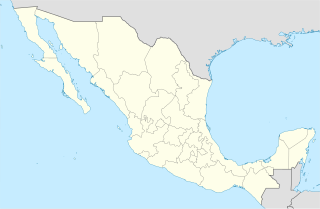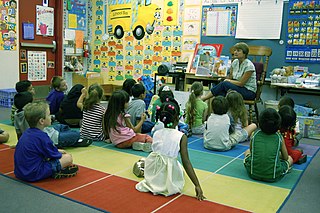
Head Start is a program of the United States Department of Health and Human Services that provides comprehensive early childhood education, health, nutrition, and parent involvement services to low-income children and families. The program's services and resources are designed to foster stable family relationships, enhance children's physical and emotional well-being, and establish an environment to develop strong cognitive skills. The transition from preschool to elementary school imposes diverse developmental challenges that include requiring the children to engage successfully with their peers outside the family network, adjust to the space of a classroom, and meet the expectations the school setting provides.

A preschool, also known as nursery school, pre-primary school, playschool or kindergarten, is an educational establishment or learning space offering early childhood education to children before they begin compulsory education at primary school. It may be publicly or privately operated, and may be subsidised from public funds.
Early childhood education is a branch of education theory that relates to the teaching of children from birth up to the age of eight. Traditionally, this is up to the equivalent of third grade. ECE emerged as a field of study during the Enlightenment, particularly in European countries with high literacy rates. It continued to grow through the nineteenth century as universal primary education became a norm in the Western world. In recent years, early childhood education has become a prevalent public policy issue, as municipal, state, and federal lawmakers consider funding for preschool and pre-K. It is described as an important period in a child's development. It refers to the development of a child's personality. ECE is also a professional designation earned through a post-secondary education program. For example, in Ontario, Canada, the designations ECE and RECE may only be used by registered members of the College of Early Childhood Educators, which is made up of accredited child care professionals who are held accountable to the College's standards of practice.
The Reggio Emilia approach is an educational philosophy focused on preschool and primary education. It is a pedagogy described as student-centered and constructivist that uses self-directed, experiential learning in relationship-driven environments. The program is based on the principles of respect, responsibility, and community through exploration and discovery through a self-guided curriculum. At its core is an assumption that children form their own personality during early years of development and are endowed with "a hundred languages", through which they can express their ideas. The aim of the Reggio approach is to teach how to use these symbolic languages in everyday life. It was developed after World War II by pedagogist Loris Malaguzzi and parents in the villages around Reggio Emilia, Italy, and derives its name from the city.
The Early Childhood Education Act is the name of various landmark laws passed by the United States Congress outlining federal programs and funding for childhood education from pre-school through kindergarten. The first such act was introduced in the United States House of Representatives by Congresswoman Patsy Mink of Hawaiʻi in the 1960s. The theory behind the act is that the years before a child reaches kindergarten are the most critical to influence learning. Many children do not have access to early education before entering kindergarten. The goal of the act is to provide a comprehensive set of services for children from birth until they enter kindergarten.
The HighScope Educational Research Foundation studies methods of early childhood education based on the methods of the 1962 Perry Preschool study. It was founded in 1970 by psychologist David Weikart.
Family literacy is a method of education. Relatively new, family literacy is being put into practice in the United States, Canada, and South Africa.

San Roberto International School, formerly known as Instituto San Roberto, is a private school in Monterrey, Mexico, founded in 1982 by Mrs. Monica Sada. As of June 2015, San Roberto International School belongs to Nord Anglia Education, the world's leading premium schools organization.

Operation Brotherhood Montessori Center Incorporated is an Italian-based school in the Philippines named after Maria Montessori. It was founded by former UNESCO-Philippines Secretary-General Amb. Preciosa Soliven in 1966. The mother organization Operation Brotherhood International was founded by Oscar G. Arellano. OBI provided medical help and community upliftment assistance to the war refugees in Vietnam and Laos. When OBI started operations in the Philippines in 1963, village projects became its first priority including schools for the poor. Ambassador Preciosa S. Soliven who had been teaching young children in Vietnam and later worked with a Swiss Montessori preschool teacher in Makati was asked by OBI to manage these schools. OB Montessori offers toddler, pre-school, elementary school, high school and college levels and is the first school in the Philippines to use the Montessori method. Oscar G. Arellano, founder of OBI Phils also opened another Montessori school in 1975. Smaller in scale compared to its neighbor and counterpart, OB Montessori Center. This little school is nestled in Barangay Addition Hills, San Juan City.

Established in 1938, the Atlanta Speech School is a brain research-backed comprehensive language and literacy school providing educational as well as clinical programs. In addition, Atlanta Speech School's Rollins Center provides professional development for teachers and educators in partner schools and preschools. Rollins' work focuses on the eradication of illiteracy, a mission amplified by their online presence, Cox Campus. Cox Campus is a universally-accessible learning environment with coursework targeted for educations of children age 0-8.
The learning center strategy uses eight basic learning centers to address the countless objectives of American early childhood classrooms, attempting to develop the student’s social, emotional, physical, cognitive, and aesthetic abilities.

The Harold E. Jones Child Study Center is a research and educational institution for young children at the University of California, Berkeley. It is one of the oldest continuously running centers for the study of children in the country. The Jones Child Study Center has a special relationship with the Institute of Human Development as a site for research, training and outreach to the community, parents, and teachers. The Institute of Human Development's fundamental mission is to study evolutionary, biological, psychological, social, and cultural factors that affect human development from birth through old age. Research conducted at the Institute of Human Development and the Jones Child Study Center is interdisciplinary: psychology, education, social welfare, architecture, sociology, linguistics, public health, and pediatrics. The primary audiences for the findings include scholars and parents. Faculty, postdoctoral, graduate, and undergraduate students observe and test children attending the preschool for their research projects. Undergraduate students in Early Childhood Education may also gain experience in the classrooms as teachers' assistants.

The Massachusetts Department of Elementary and Secondary Education (DESE), sometimes referred to as the Massachusetts Department of Education, is the state education agency for the Commonwealth of Massachusetts, identified by the U.S. Department of Education. It is responsible for public education at the elementary and secondary levels. The agency has its headquarters in Malden. It is governed by the Massachusetts Board of Education.
Susan Neuman is an educator, researcher, and education policy-maker in early childhood and literacy development. In 2013, she became Professor of Early Childhood and Literacy Education, and Chair of the Department of Teaching and Learning at NYU's Steinhardt School of Culture, Education, and Human Development.

Indigenous education specifically focuses on teaching indigenous knowledge, models, methods, and content within formal or non-formal educational systems. The growing recognition and use of indigenous education methods can be a response to the erosion and loss of indigenous knowledge through the processes of colonialism, globalization, and modernity. Indigenous communities are able to "reclaim and revalue their languages and [traditions], and in so doing, improve the educational success of indigenous students", thus ensuring their survival as a culture.
Social competence consists of social, emotional, cognitive and behavioral skills needed for successful social adaptation. Social competence also reflects having an ability to take another's perspective concerning a situation, learn from past experiences, and apply that learning to the changes in social interactions.
Partners in Development Foundation (PIDF), an IRS Section 501(c)(3) non-profit public foundation, was incorporated in 1997 in Honolulu, Hawaiʻi. It has established and implemented programs in the areas of education, social services, Hawaiian culture, Hawaiian language, and preservation of the natural environment and traditional Hawaiian agriculture. These programs now have served close to ten thousand people in communities throughout Hawai‘i. In 2011, PIDF received grants of more than $1.6 million from the US Department of Education through the Native Hawaiian Education Act. The grants were awarded for the purpose of continuing, expanding, and improving the educational programs of PIDF.
Curricula in early childhood care and education (ECCE) address the role and importance of curricula in the education of young children, and is the driving force behind any ECCE programme. It is ‘an integral part of the engine that, together with the energy and motivation of staff, provides the momentum that makes programmes live’. It follows therefore that the quality of a programme is greatly influenced by the quality of its curriculum. In early childhood, these may be programmes for children or parents, including health and nutrition interventions and prenatal programmes, as well as centre-based programmes for children.

Kindergarten readiness refers to the developmental domains that contribute to children's ability to adapt to the kindergarten classroom, which is often a new and unfamiliar environment. There is no single agreed upon definition of Kindergarten readiness. The domains often included in the definition include, academic skills, social-emotional development, and physical development. In addition to these competencies, the child's environment and opportunities for learning should also be considered. This includes the child's home environment and their interactions with teachers and peers.
Laura M. Justice is a language scientist and expert on interventions to promote children's literacy. She is the EHE Distinguished Professor of Educational Psychology at Ohio State University, where she also serves as the Executive Director of the A. Sophie Rogers School for Early Learning.








